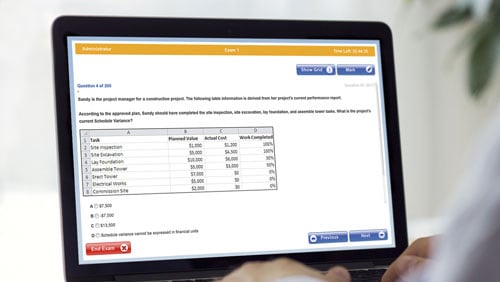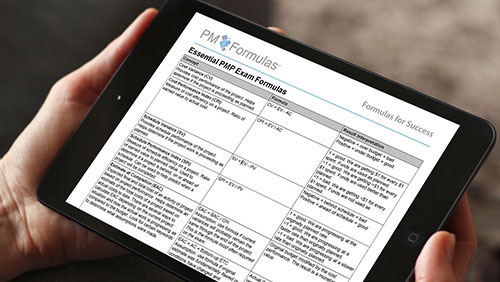Learn Three Great Ways to Prepare for Your PMP® Exam
 So, you’ve started the Project Management Professional (PMP)® application process and are preparing to take the PMP® Exam. Great career move! The PMP Certificate is a highly sought after career demarcations in both prosperous and challenging economic times. It is the recognition of “demonstrated knowledge and skill in leading and directing project teams and in delivering project results within the constraints of schedule, budget and resources.” (Project Management Institute) Each candidate submits past project management history in an application process, and then must pass a four-hour / 200-question PMP exam.
So, you’ve started the Project Management Professional (PMP)® application process and are preparing to take the PMP® Exam. Great career move! The PMP Certificate is a highly sought after career demarcations in both prosperous and challenging economic times. It is the recognition of “demonstrated knowledge and skill in leading and directing project teams and in delivering project results within the constraints of schedule, budget and resources.” (Project Management Institute) Each candidate submits past project management history in an application process, and then must pass a four-hour / 200-question PMP exam.
Aside from the fact that you’ll need 35 contact hours to sit for the exam, studying for the PMP exam itself is a project unto itself. Just like most certification exams, you have three basic ways of preparing for the exam: traditional classroom-based training, online courses and self-study. But don’t feel limited to just one. Many people who have passed the exam have used a combination of these.
Option 1: Traditional PMP Classroom Training
Classroom Based Training requires the least amount of self discipline and comes in a variety of flavors. Your local Project Management Institute (PMI)® chapters and trusted education providers offer workshops, boot camps and classes specifically designed to teach not only what you must know, but how you will be asked to demonstrate it. Make sure your teacher is a PMP; taking the exam is an experience unto itself, and you want to know that your instructor has “been there/done that.” Classroom Based Training can account for all or part of your thirty-five (35) contact hours required to sit for the PMP exam.
Option 2: PMP Online Training Course
Online courses are great for people on the go and are usually less expensive than classroom based training because of the course provider’s lower overhead. They are usually much cheaper than instructor lead classroom courses. This option requires a medium amount of self discipline in that you have the flexibility of studying within your schedule. Online course usually offer a combination of webinars that you watch, web pages that you read, and documents that you download to study.
Some have deadlines, and some do not, so though you have the freedom to complete sections on your own you’ll need a medium amount of self-discipline to insure that you finish within the time allowed by you or the requirements of the course itself. Like the Classroom Based Training, online courses can account for all or part of your thirty-five (35) contact hours required to sit for the PMP exam. If this is important in your plan, be sure to confirm before you sign on the dotted line.
Option 3: PMP Self Study Preparation
Self Study is the least expensive and therefore the most common way that people study for the PMP Exam and requires the most self-discipline. The good things about this method are that you’ll save money and you to prepare on your own time. That also means you’ll need to be motivated.
The biggest road blocks you’ll face using this method is that you’ll have to create your own lesson plan and schedule, and you’ll have to evaluate and buy your own materials. If you’re dedicated and focused, this is a great way to prepare. Furthermore, self-study cannot be counted towards the 35 contact hour requirement. You must use classroom or online training for that.
Regardless of which method you choose, most successful people who pass the PMP exam supplement self-study preparation with at least a classroom and/or an online course. With the advent of portable media players such as the iPod, iPhone, Blackberry and Zune, many choose a combination of online training and self-study: Downloadable videocast and/or podcast courses allowing you to take the material with you and study anywhere and anytime. It’s a very powerful, cost effective and goal oriented solution.
Watch this video for more study tips and techniques for your pmp studies:
Regards,
Cornelius Fichtner, PMP
Principal Instructor
The Project Management PrepCast™


